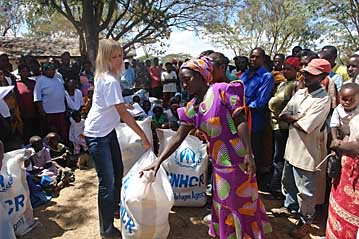UNHCR reaches the neediest in Kenyan countryside
UNHCR reaches the neediest in Kenyan countryside

MOGOTIO, Kenya, January 24 (UNHCR) - When UNHCR staff arrived in the market town of Mogotio in western Kenya earlier this week they found some 500 people sleeping in the grounds of the police station without shelter, blankets or basic supplies.
The UN refugee agency has found similar scenes in other parts of Rift Valley Province since violence between rival communities swept through the area after the December 30 presidential election. In recent days UNHCR has been able to reach out to the most vulnerable in the countryside as the prospect of stability returns.
On Wednesday, teams from UNHCR and the Kenya Red Cross Society came to Mogotio from the provincial capital Nakuru and distributed 10 lightweight tents and 70 family kits, each for five people and containing plastic sheeting for shelter, blankets, jerry cans, mosquito nets, sanitary supplies, soap and kitchen sets.
This was the first humanitarian assistance to reach the hundreds of internally displaced people (IDPs) since they arrived in Mogotio more than three weeks ago. Aid efforts have been hampered by security concerns in the west of the country, where most of the violence has taken place, but UNHCR supplies and experts are moving out from major towns like Nakuru and Eldoret to smaller communities like Mogotio.
"We continue to distribute much needed humanitarian supplies to the displaced people in the most affected areas in the country. Security allowing, we should be able to reach thousands of people in the provinces who have not been able to access humanitarian assistance," said Alice Ballah-Conteh, head of UNHCR's emergency team in Kenya.
The government says some 600 people have been killed and about 250,000 displaced by the violence, including about 90,000 in Rift Valley Province. A few thousand Kenyans have fled to Uganda.
Many of the displaced are living in churches, police stations and other public buildings in Nairobi and provincial towns in the west after being driven out of their homes. The IDPs camped in Mogotio said they had co-existed peacefully with their attackers for years. Most of the displaced sleep in the open, where it is chilly and rainy.
"It is so cold at night that these people should not sleep outside," said Line Pedersen, a member of the UNHCR emergency response team. "Children are the most affected," she added. Some children and old women stay in the only available building at the police station.
Many of the IDPs worked on a nearby sisal plantation, which was attacked and burned down by armed men after the disputed election result was announced. The violence spread to nearby areas and at least three people were killed on the first day.
The aid supplies brought by UNHCR and the Red Cross, though not large in quantity, were accepted with gratitude by Mogotio's displaced, most of whom had tales of terror to recount.
"God bless you people for this help," said Lucy, as she took a family kit from the UNHCR and Red Cross teams. The 53-year-old said two of her daughters were married to members of the community that attacked and torched her house.
To date, UNHCR has delivered 3,152 household/family kits and 10,000 sanitary towels to the Kenya Red Cross Society for distribution in different parts of the country, including Nairobi, Nakuru and Eldoret. The agency, which is ready to help 100,000 people, has transported 530 lightweight family tents to Nakuru this week.
UNHCR also sent two computers this week to Kitale and Eldoret to help local officials with data management. A UNHCR expert in site planning is now in Nakuru to help the government and the Red Cross prepare shelter for IDPs.
By Emmanuel Nyabera in Mogotio, Kenya








